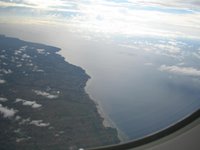
9 May 2006. Tuesday of the 4th Week of Easter
Acts 11, 19-26; Psalm 87; John 10, 22-30
The first reading tells us how the Gospel was spread like wildfire. The Greek-speaking Christian Jews fled Jerusalem because of the persecution that arose because of the stoning of Stephen. These Christians spread the Gospel as far as Phoenicia, Cyprus and Antioch. But soon, their message spread to non-Jews who believed and were baptized.
The news reached Jerusalem, thus the Church in Jerusalem sent Barnabas to Antioch to assess the situation. Barnabas saw evidence of God’s grace in Antioch that they rejoiced and encouraged them all to remain faithful to the Lord in the firmness of heart. With Saul from Tarsus, Barnabas nurtured the faith in Antioch where they were first called Christians.
Both the first reading and the Gospel thus agree that the spread of the Gospel and the growth of the community both in Jerusalem and outside of it is the work of God’s hands. While the role of the members of the community is to witness and be open to it. In other words, the people of all nations, as the responsorial psalm says (Psalm 87), who believed and who asked for baptism were all ‘drawn by the Father to Jesus’ --- the sheep who knew Jesus’ voice as the Gospel tells us. The fitting response of the first Christians is to rejoice, to witness and to be open to these new development: from a Jewish sect to a universal church.
Fr. John P. Delaney SJ said that the church should be open to all kinds of people: no gates no walls. Those who come to the UP church are diverse. Here we have a cross-section of society: university personnel (students, faculty --- the academic community), the people from different areas. People from different economic and social brackets. People of different temperaments. Those who come in veils and those who come with much to show. Do we rejoice over the diversity of people who come to our Church to worship and to pray? These are the people who find God in our parish. Are we happy that they come?
Second, there are people who come to this church with many questions. In the advent of books, movies and television programs such as the Da Vinci Code and the Judas Gospel, many people are asking questions about our faith. In a way, we are like the Jerusalem community faced by the newness of converts from a different race and shaken by the newness of it, do we react to the questions or do we try to find the answers to these questions? Do we win them by the ‘basta argument’ (just believe, don’t question) or do we educate? Or are we afraid to face them because we know we also do not know? The hard thing to accept is that many of us have stopped studying our faith or even read the bible. What we miss is the fact that to witness to our faith, we also must know why we believe in it. Our faith is reasonable. We should not stop from getting to know it.
Finally, Fr. Delaney built this Church in a transitory period: between Vatican I and Vatican II. Are we open to new things and new ideas where many new ways of worship or ways of doing things are being introduced? Or are we content with just how things are --- and remain petrified and stagnant? We have to trust that the hands of God works in the Church, and we, as a people are being asked to be witnesses to it, to rejoice to whatever new things are happening, and to open to these changes. Vatican II calls the Church, a pilgrim church, a church in transit.
*plane shot by Neo Saicon SJ


1 comment:
How can we get to know more about the faith when there's no one to teach us? Where can one go for a deeper understanding of the faith here in UP?
Post a Comment